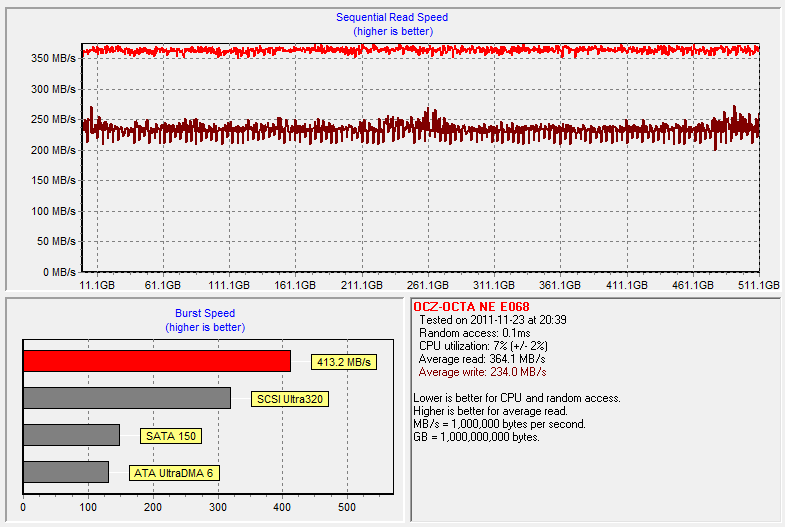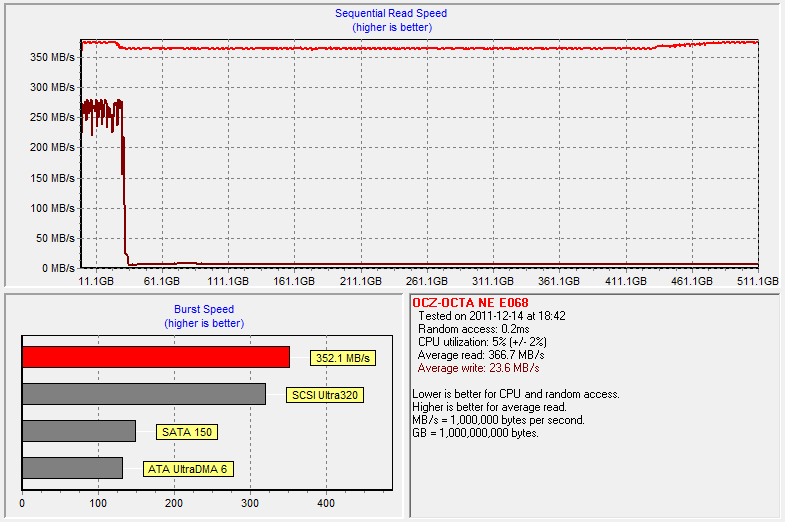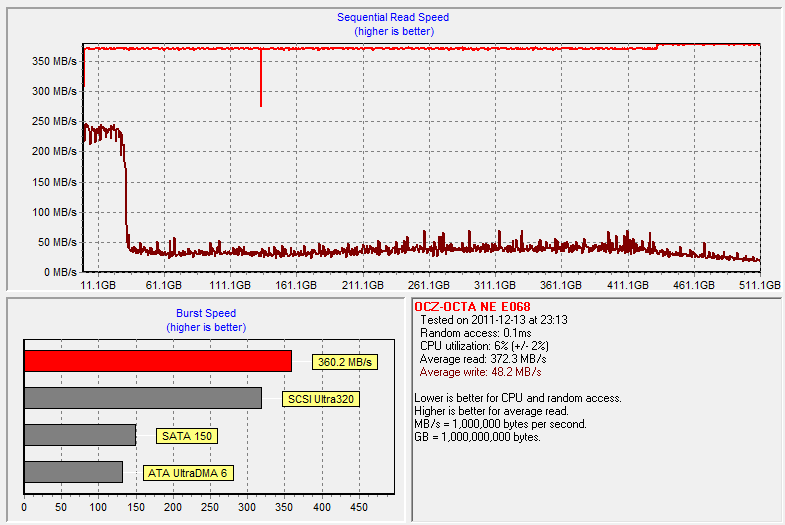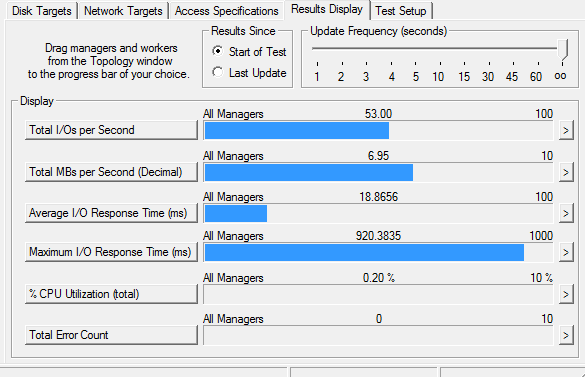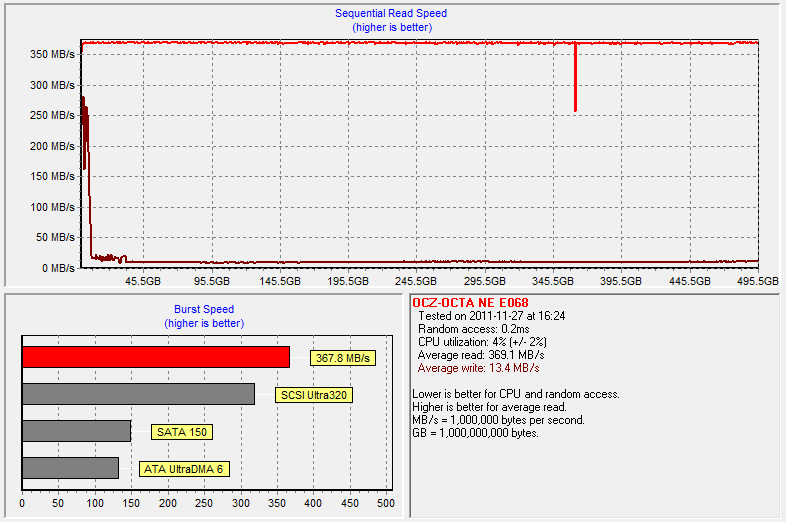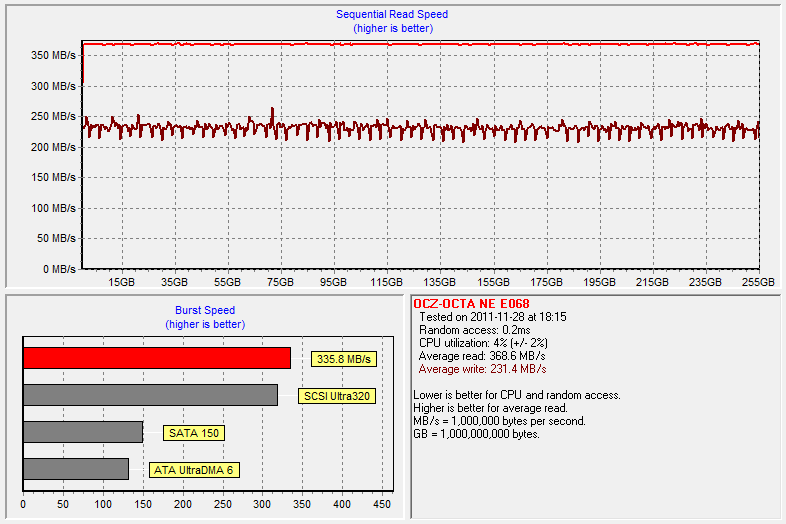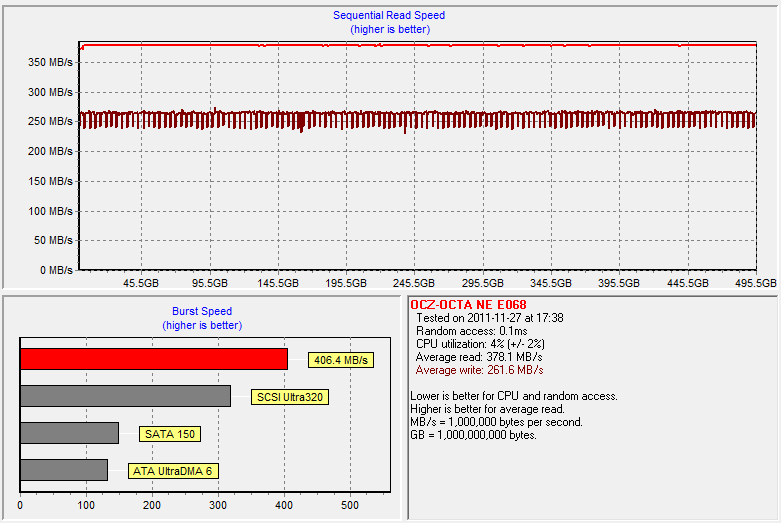OCZ Octane 512 GB SSD Review: Meet Indilinx's Everest Controller
Performance Over Time And TRIM
Clean Performance
Examining how a drive might perform over time isn't difficult. First, we fill up the user-accessible space using a sequential write, making the drive "dirty." Then, we overwrite that data using a 4 KB random write pattern. Because the drive is full of data, though, garbage collection can't consolidate the drive's scattered pages into free blocks. When we start writing over with sequential data again, the effects of active garbage collection kick in.
20 Minutes Of Random Writes
According to Iometer, sequential read/write performance should be 340/260 MB/s fresh out of box. Yet, after filling the drive with sequential data, hammering it for 20 minutes with random data, and the writing sequentially to it again, the performance story is quite a bit different. While sequential writes start at 250 MB/s, they quickly drop to 6 MB/s.
The point of this exercise, as accelerated as it is, is to replicate the worst-case situation in which you'd find yourself after writing to every available block, leaving no free blocks for the controller to use a scratch space.
If you introduce some idle time, Octane slightly recovers performance, but we're still dealing with a sequential write speed around 40-50 MB/s.
30 Minutes Of Random Writes
Get Tom's Hardware's best news and in-depth reviews, straight to your inbox.
We already know that, even fresh out of its box, Octane's random performance is lower than most of today's modern 6 Gb/s drives. As a result, it's impossible to make all of the blocks "dirty" after 20 minutes of random writes using a queue depth of four. The remaining "clean" blocks end up obscuring what would become a more notable issue.
If we rerun the test with a queue depth of 32 and hammer the drive for 30 minutes, amplifying our previous experiment, performance drops to 7 MB/s and stays there. No matter how long you let the drive sit idle, hoping for background garbage collection to kick in and clean things up, it doesn't recover its performance. This is an issue with the Octane that we asked OCZ to comment on, but received no response. Dirty the drive completely and it appears to be toast.
Increasing Over-Provisioning
Remember a few pages back where we told you that OCZ doesn't set aside any of the Octane's NAND for over-provisioning? Crucial does the same thing with its m4, only it's able to recover more gracefully from a completely dirty state. What, then, could be the issue with Octane?
It might seem to make sense that creating a smaller-than-full partition on OCZ's drive could be a solution, manually over-provisioning it. The solution to Octane's problem isn't as simple as setting aside a little bit of unpartitioned capacity to emulate over-provisioning. Check out the diagrams below:
When we manually specify over-provisioning, the controller is able to actively free up space after the drive gets hammered with random writes. There is one catch. The amount of space the drive is able to make available for "like-new" write performance is proportional to what you over-provision. In the first diagram, we manually set 2.5%, and performance is solid for about that long. In the second diagram, half of the drive is set aside for over-provisioning, and in that case, its performance persists.
The thing is, nobody is willing to set aside half of their 512 GB SSD so that, when the drive is filled with data, performance doesn't fall off. Thus, the only real way to avoid the pitfalls of Everest's garbage collection shortcomings is to make sure you're using a system able to utilize the TRIM command. That means avoiding these things in RAID or on an older operating system.
| Transferring H.264 MovieAverage Write Speed | Clean Performance | Dirty Performance |
|---|---|---|
| No Over-provisioning | ~ 250 MB/s | ~ 7 MB/s |
| 2.5% Over-provisioning | ~ 250 MB/s | ~ 10 MB/s |
| 50% Over-provisioning | ~ 250 MB/s | ~ 250 MB/s |
Here's the same sort of experiment, related in real-world terms rather than less-tangible HD Tach stuff. The difference between our "clean" and "dirty" drive with over-provisioning in place is crystal clear when we write a 32 GiB Blu-ray rip to the drive. Without an abundance of over-provisioning, the transfer rate becomes extraordinarily slow.
TRIM Performance
We already know that, if you let the Octane sit idle, it's only able to partially recover its performance. However, if you empty your Recycle Bin in Windows, triggering the TRIM command, speeds recover fully, as illustrated in the above diagram.
Current page: Performance Over Time And TRIM
Prev Page Sequential Performance Versus Transfer Size Next Page Octane: A Portent Of What's To Come From OCZ-
ksampanna theuniquegamerI think in 2 to 3 years we can get a affodable and fast 1tb ssd in marketReply
Fast yes, affordable no. My guess is atleast 5 years for a 1 TB ssd to be under $100 -
EDVINASM Still comparing Crysis 2 to everything that moves? I had WD Blue in RAID 0 for quite a while and was relatively happy. Before Christmas however, I have replaced them with just simple, SATA 300 Intel 320 SSD 80Gb. Boy what a difference! No more HDD scratchy sounds, no heat from them, no vibrations, no annoying ticks when idle, silent.. Speed wise PC boots up within 30 sec, and I am only running Intel i3 2100 with no OC. To those who are holding onto HDD I would say unless capacity is the key - sell it off for an SSD. Especially now that HDD prices are skyroketting it is proving easier and easier to do the swap.Reply -
nebun ksampannaFast yes, affordable no. My guess is at least 5 years for a 1 TB ssd to be under $100it's so much fun to dream....don't expect prices to drop that much....that's what people people said about CPUs a few years back, yet nothing has changed.... another example is the mid and top end video cards....since manufacturing techniques have improved and have become more efficient one would think that the products would be cheaper....that's not the case....it's called demmand....people demand faster components and will pay a premium price for it, why would manufacturers drop the prices?...they still have to make a profitReply -
mayankleoboy1 theuniquegamerI think in 2 to 3 years we can get a affodable and fast 1tb ssd in marketReply
yeah.
and in 2 to 3 years we can get a 20 core intel 9999 X edition for $50.
and gtx990X2 for just $100. -
buzznut edvinasmStill comparing Crysis 2 to everything that moves? I had WD Blue in RAID 0 for quite a while and was relatively happy. Before Christmas however, I have replaced them with just simple, SATA 300 Intel 320 SSD 80Gb. Boy what a difference! No more HDD scratchy sounds, no heat from them, no vibrations, no annoying ticks when idle, silent.. Speed wise PC boots up within 30 sec, and I am only running Intel i3 2100 with no OC. To those who are holding onto HDD I would say unless capacity is the key - sell it off for an SSD. Especially now that HDD prices are skyroketting it is proving easier and easier to do the swap.Reply
And I recommend folks hold onto their current hard drives and get a boot SSD. 80GB may be enough for you, but a lot of us have bigger storage needs. Its gonna take about a year for the hard drive market to recover, so hang on to those mechanical drives. -
drwho1 theuniquegamerI think in 2 to 3 years we can get a affodable and fast 1tb ssd in marketReply
mayankleoboy1yeah.and in 2 to 3 years we can get a 20 core intel 9999 X edition for $50.and gtx990X2 for just $100.
I do believe that 3-5 years from now we will see a huge increase on performance accompanied by a huge drop in price (compare with today's prices and performance)
Then we will probably have SATA 4 on the market and the "right price/GB/TB" will be on SATA 3 SSD's.
With that in mind, I have always build my systems a generation "behind" which is always more than "a few" generations of whatever I had built last, I have always double or triple my previous built performance for around the same money invested on it.
(plus/minus a few new "tricks" that probably were not on the previous built that could raise my budget
200 dollars or so)
Is is possible to get an 1TB SSD for around $100-$200 dollars in 3-5 years?
I believe it will be.
just don't expect to also be the faster SATA 4, you will have to "compromise" by been a little "behind"
in speed.
-
tetracycloide nebunthat's what people people said about CPUs a few years back, yet nothing has changedAMD Athlon 64 4000+ San Diego 2.4GHz circa 2005 - $475.99 inflation adjusted to 2011 ~$548.22Reply
Intel Core 2 Duo E6850 Conroe 3.0GHz circa 2007 - $279.99 inflation adjusted to 2011 ~$304.10
Intel Core i5-2500K Sandy Bridge 3.3GHz circa 2011 - $219.99
I'm sorry, you were saying?
